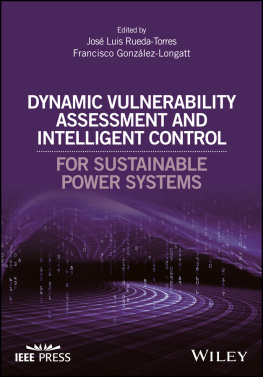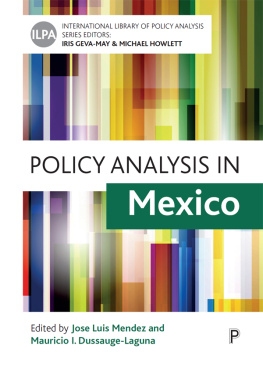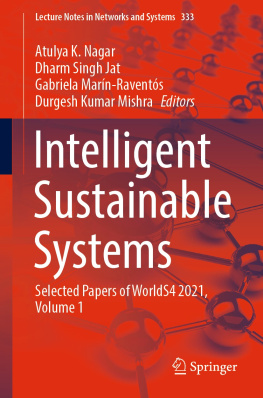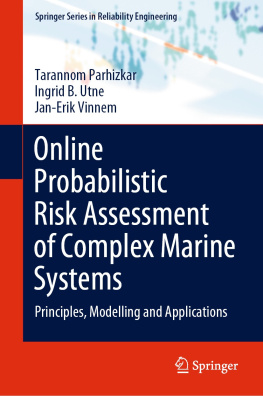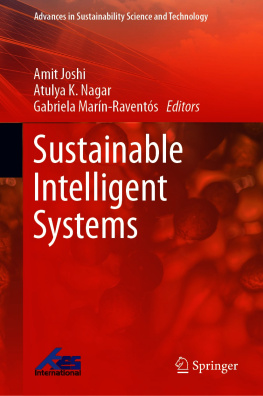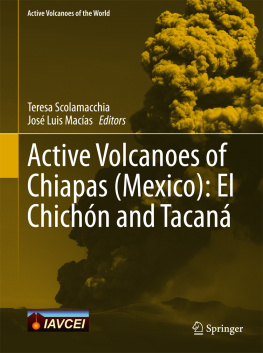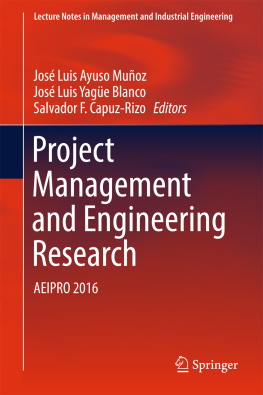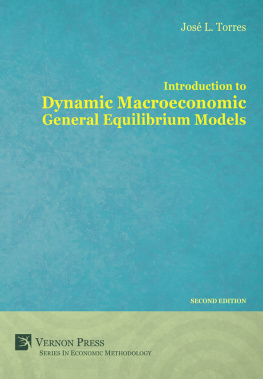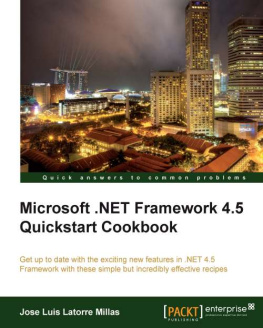José Luis Rueda-Torres - Dynamic Vulnerability Assessment and Intelligent Control: For Sustainable Power Systems
Here you can read online José Luis Rueda-Torres - Dynamic Vulnerability Assessment and Intelligent Control: For Sustainable Power Systems full text of the book (entire story) in english for free. Download pdf and epub, get meaning, cover and reviews about this ebook. year: 2018, publisher: Wiley-IEEE Press, genre: Politics. Description of the work, (preface) as well as reviews are available. Best literature library LitArk.com created for fans of good reading and offers a wide selection of genres:
Romance novel
Science fiction
Adventure
Detective
Science
History
Home and family
Prose
Art
Politics
Computer
Non-fiction
Religion
Business
Children
Humor
Choose a favorite category and find really read worthwhile books. Enjoy immersion in the world of imagination, feel the emotions of the characters or learn something new for yourself, make an fascinating discovery.
- Book:Dynamic Vulnerability Assessment and Intelligent Control: For Sustainable Power Systems
- Author:
- Publisher:Wiley-IEEE Press
- Genre:
- Year:2018
- Rating:5 / 5
- Favourites:Add to favourites
- Your mark:
- 100
- 1
- 2
- 3
- 4
- 5
Dynamic Vulnerability Assessment and Intelligent Control: For Sustainable Power Systems: summary, description and annotation
We offer to read an annotation, description, summary or preface (depends on what the author of the book "Dynamic Vulnerability Assessment and Intelligent Control: For Sustainable Power Systems" wrote himself). If you haven't found the necessary information about the book — write in the comments, we will try to find it.
Dynamic Vulnerability Assessment and Intelligent Control: For Sustainable Power Systems — read online for free the complete book (whole text) full work
Below is the text of the book, divided by pages. System saving the place of the last page read, allows you to conveniently read the book "Dynamic Vulnerability Assessment and Intelligent Control: For Sustainable Power Systems" online for free, without having to search again every time where you left off. Put a bookmark, and you can go to the page where you finished reading at any time.
Font size:
Interval:
Bookmark:

This edition first published 2018
2018 John Wiley & Sons Ltd
All rights reserved. No part of this publication may be reproduced, stored in a retrieval system, or transmitted, in any form or by any means, electronic, mechanical, photocopying, recording or otherwise, except as permitted by law. Advice on how to obtain permission to reuse material from this title is available at http://www.wiley.com/go/permissions.
The right of Jos Luis Rueda-Torres and Francisco Gonzlez-Longatt to be identified as the authors of the editorial material in this work has been asserted in accordance with law.
Registered Offices
John Wiley & Sons, Inc., 111 River Street, Hoboken, NJ 07030, USA
John Wiley & Sons Ltd, The Atrium, Southern Gate, Chichester, West Sussex, PO19 8SQ, UK
Editorial Office
The Atrium, Southern Gate, Chichester, West Sussex, PO19 8SQ, UK
For details of our global editorial offices, customer services, and more information about Wiley products visit us at www.wiley.com.
Wiley also publishes its books in a variety of electronic formats and by print-on-demand. Some content that appears in standard print versions of this book may not be available in other formats.
Limit of Liability/Disclaimer of Warranty
While the publisher and authors have used their best efforts in preparing this work, they make no representations or warranties with respect to the accuracy or completeness of the contents of this work and specifically disclaim all warranties, including without limitation any implied warranties of merchantability or fitness for a particular purpose. No warranty may be created or extended by sales representatives, written sales materials or promotional statements for this work. The fact that an organization, website, or product is referred to in this work as a citation and/or potential source of further information does not mean that the publisher and authors endorse the information or services the organization, website, or product may provide or recommendations it may make. This work is sold with the understanding that the publisher is not engaged in rendering professional services. The advice and strategies contained herein may not be suitable for your situation. You should consult with a specialist where appropriate. Further, readers should be aware that websites listed in this work may have changed or disappeared between when this work was written and when it is read. Neither the publisher nor authors shall be liable for any loss of profit or any other commercial damages, including but not limited to special, incidental, consequential, or other damages.
Library of Congress Cataloging-in-Publication Data:
Names: Rueda-Torres, Jos Luis, 1980- author. | Gonzlez-Longatt, Francisco, 1972- author.
Title: Dynamic vulnerability assessment and intelligent control for sustainable power systems / edited by Professor Jos Luis Rueda-Torres, Professor Francisco Gonzlez-Longatt.
Description: First edition. | Hoboken, NJ : John Wiley & Sons, 2018. | Includes bibliographical references and index. |
Identifiers: LCCN 2017042787 (print) | LCCN 2017050856 (ebook) | ISBN 9781119214977 (pdf) | ISBN 9781119214960 (epub) | ISBN 9781119214953 (cloth)
Subjects: LCSH: Electric power distribution--Testing. | Smart power grids.
Classification: LCC TK3081 (ebook) | LCC TK3081 .D96 2018 (print) | DDC 621.31/7-dc23
LC record available at https://lccn.loc.gov/2017042787
Cover design by Wiley
Cover image: agsandrew/Gettyimages
Jaime C. Cepeda
Operador Nacional de Electricidad (CENACE), and Escuela Politcnica Nacional (EPN)
Quito
Ecuador
Dirk Van Hertem
ESAT Electa
University of Leuven
Belgium
Steven De Boeck
ESAT Electa
University of Leuven
Belgium
Hakan Ergun
ESAT Electa
University of Leuven
Belgium
Evelyn Heylen
ESAT Electa
University of Leuven
Belgium
Tom Van Acker
ESAT Electa
University of Leuven
Belgium
Marten Ovaere
Department of Economics
University of Leuven
Belgium
Bart W. Tuinema
Delft University of Technology
The Netherlands
Nikoleta Kandalepa
TenneT TSO B.V
Arnhem
The Netherlands
Qing Liu
Kyushu Institute of Technology
Kitakyushu
Japan
Hassan Bevrani
University of Kurdistan
Sanandaj
Iran
Yasunori Mitani
Kyushu Institute of Technology
Kitakyushu
Japan
Delia G. Colom
Universidad Nacional de San Juan
Argentina
Istvn Erlich
University Duisburg-Essen
Duisburg
Germany
Florin Capitanescu
Luxembourg Institute of Science and Technology, Belvaux
Luxembourg
Da Wang
Delft University of Technology
The Netherlands
Worawat Nakawiro
King Mongkut's Institute of Technology Ladkrabang
Bangkok
Thailand
Adedotun J. Agbemuko
Institut de Recerca en Energia de Catalunya (IREC)
Barcelona
Spain
Mario Ndreko
TenneT TSO GmbH
Bayreuth
Germany
Marjan Popov
Delft University of Technology
The Netherlands
Mart A.M.M. van der Meijden
TenneT TSO B.V
Arnhem
The Netherlands and Delft University of Technology
The Netherlands
Hoan Van Pham
Power Generation Corporation 2
Vietnam Electricity and School of Engineering and Technology
Tra Vinh University
Vietnam
Sultan Nasiruddin Ahmed
FGH GmbH
Aachen
Germany
Gustavo Valverde
University of Costa Rica
San Jose
Costa Rica
Hamid Soleimani Bidgoli
Universit de Lige
Belgium
Petros Aristidou
University of Leeds
United Kingdom
Mevludin Glavic
Universit de Lige
Belgium
Thierry Van Cutsem
Universit de Lige
Belgium
Nelson Granda
Escuela Politcnica Nacional
Quito
Ecuador
Rommel P. Aguilar
Universidad Nacional de San Juan
Argentina
Fabin E. Prez-Yauli
Escuela Politcnica Nacional
Quito
Ecuador
Pablo X. Verdugo
Operador Nacional de Electricidad (CENACE)
Quito
Ecuador
Aharon B. De La Torre
Operador Nacional de Electricidad (CENACE)
Quito
Ecuador
Diego E. Echeverra
Operador Nacional de Electricidad (CENACE)
Quito
Ecuador
Over the last decades, the electrical power system has gone through a fundamental transformation never seen before. The liberalisation of the power industry that set the whole process in motion has opened up the possibility of electricity trading across utility and even national boundaries. The distance between where power is generated and where the final consumption takes place and with it the power transit through the high voltage transmission lines has increased immensely. A further development compounding the competitive electricity market and power transmission over long distances has been the large-scale installation of renewables-based power generation units. In addition to the volatility and stochasticity of the power outputs of these units, utilities now also have to contend with possible bi-directional power flows in the distribution networks.
Due to the different dynamic characteristics of renewable generation units compared with conventional power plants, the increasing share of renewables-based generation capacity in the system can give rise to new dynamic phenomena that can reduce the existing security of the whole system. Additionally, restrictions regarding expansion or reinforcement of the existing network mean that lines have to be loaded up to or near their maximum current carrying capabilities. It can thus be safely concluded that the increasing uncertainty regarding load flows and the use of power plants in a heavily loaded network, together with the new power generation technologies such as wind and solar as well as transmission technologies such as VSC-HVDC, would necessarily lead to the reduction of existing security levels unless appropriate countermeasures are implemented.
Next pageFont size:
Interval:
Bookmark:
Similar books «Dynamic Vulnerability Assessment and Intelligent Control: For Sustainable Power Systems»
Look at similar books to Dynamic Vulnerability Assessment and Intelligent Control: For Sustainable Power Systems. We have selected literature similar in name and meaning in the hope of providing readers with more options to find new, interesting, not yet read works.
Discussion, reviews of the book Dynamic Vulnerability Assessment and Intelligent Control: For Sustainable Power Systems and just readers' own opinions. Leave your comments, write what you think about the work, its meaning or the main characters. Specify what exactly you liked and what you didn't like, and why you think so.

